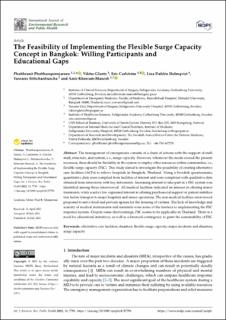| dc.contributor.author | Phattharapornjaroen, Phatthranit | |
| dc.contributor.author | Glantz, Viktor | |
| dc.contributor.author | Carlström, Eric | |
| dc.contributor.author | Holmqvist, Lina Dahlén | |
| dc.contributor.author | Sittichanbuncha, Yuwares | |
| dc.contributor.author | Khorram-Manesh, Amir | |
| dc.date.accessioned | 2022-10-18T13:15:18Z | |
| dc.date.available | 2022-10-18T13:15:18Z | |
| dc.date.created | 2022-02-24T13:52:05Z | |
| dc.date.issued | 2021 | |
| dc.identifier.citation | Phattharapornjaroen, P., Glantz, V., Carlström, E., Dahlén Holmqvist, L., Sittichanbuncha, Y. & Khorram-Manesh, A. (2021). The Feasibility of Implementing the Flexible Surge Capacity Concept in Bangkok: Willing Participants and Educational Gaps. International Journal of Environmental Research and Public Health, 18(15), Artikkel 7793. | en_US |
| dc.identifier.issn | 1661-7827 | |
| dc.identifier.uri | https://hdl.handle.net/11250/3026711 | |
| dc.description.abstract | The management of emergencies consists of a chain of actions with the support of staff, stuff, structure, and system, i.e., surge capacity. However, whenever the needs exceed the present resources, there should be flexibility in the system to employ other resources within communities, i.e., flexible surge capacity (FSC). This study aimed to investigate the possibility of creating alternative care facilities (ACFs) to relieve hospitals in Bangkok, Thailand. Using a Swedish questionnaire, quantitative data were compiled from facilities of interest and were completed with qualitative data obtained from interviews with key informants. Increasing interest to take part in a FSC system was identified among those interviewed. All medical facilities indicated an interest in offering minor treatments, while a select few expressed interest in offering psychosocial support or patient stabilization before transport to major hospitals and minor operations. The non-medical facilities interviewed proposed to serve food and provide spaces for the housing of victims. The lack of knowledge and scarcity of medical instruments and materials were some of the barriers to implementing the FSC response system. Despite some shortcomings, FSC seems to be applicable in Thailand. There is a need for educational initiatives, as well as a financial contingency to grant the sustainability of FSC. | en_US |
| dc.language.iso | eng | en_US |
| dc.rights | Navngivelse 4.0 Internasjonal | * |
| dc.rights.uri | http://creativecommons.org/licenses/by/4.0/deed.no | * |
| dc.title | The feasibility of implementing the flexible surge capacity concept in bangkok: Willing participants and educational gaps | en_US |
| dc.type | Peer reviewed | en_US |
| dc.type | Journal article | en_US |
| dc.description.version | publishedVersion | en_US |
| dc.rights.holder | © 2021 by the authors. | en_US |
| dc.source.volume | 18 | en_US |
| dc.source.journal | International Journal of Environmental Research and Public Health (IJERPH) | en_US |
| dc.source.issue | 15 | en_US |
| dc.identifier.doi | https://doi.org/10.3390/ijerph18157793 | |
| dc.identifier.cristin | 2005199 | |
| dc.source.articlenumber | 7793 | en_US |
| cristin.ispublished | true | |
| cristin.fulltext | original | |
| cristin.qualitycode | 1 | |

